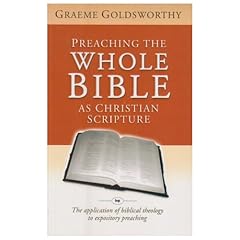
I've previously mentioned the book in a couple of posts, but here goes on a thorough-going review of the book as a whole.
Graeme Goldsworthy's book has been sitting on my bookshelves for several years, perhaps even the whole way through college. I knew it would be good, but never had the opportunity to get round to reading it. There was always more pressing books to read - either for the course or for enjoyment, and it got pushed down my list of priorities.
Recently, then, when I instituted a 'to read' shelf on my desk - a selection of the neglected books which have been crying out to be read and will be worked through and replaced as time goes on - this made the cut, and I finally got round to reading it. Now I wonder why I waited so long. Really, this book has already been making a big difference to how I think about the Scriptures and how I prepare to preach from them - and not just the Old Testament either.
For Evangelicals, the fact that the whole Bible is Christian Scripture is not beyond doubt. As Jesus says in Luke 24 the Scriptures testify to him, and he has fulfilled everything that is written about him in the Law of Moses, the Prophets and the Psalms. But in practice, we're moralists. In preaching the Old Testament, we too easily descend into moralism - dare to be a Daniel, face your giants like David did Goliath and so on. Perhaps inspiring, but not faithful to the text, if the text is written to point us to Jesus.
Goldsworthy's aim is to help us understand how the Old Testament in particular, but the whole Bible must be related to the person and work of the Lord Jesus Christ, his gospel work of cross, resurrection and ascension. Without this as our 'control' for interpretation, we can pursue lots of fanciful ideas and symbology without proclaiming what the Scriptures are proclaiming and testifying to - Jesus Christ, the Saviour.
Yet it's also a problem in the New Testament. Too often as we expound an epistle, we can turn them later implications of the gospel into moralism - forgetting that the motivation for particular behaviour is because we have been saved by Jesus for good works - not that good works are in themselves the end.
A noble aim, and an inspiring one that, as I say, has been impacting on my Bible studies ever since. Yet Goldsworthy goes about it in a rather surprising fashion. Rather than getting stuck into the texts straight away, and giving us examples of how to preach from Genesis, or from the story of Joseph, or from the Passover, or from the Prophets, or from the Psalms, he devotes the first half of the book to an introductory study in biblical theology.
This biblical theology is the driving force of the whole approach, and having covered the important aspects of the unity and inspiration of the Bible, how the Scriptures testify to Christ through its structure and progressing revelation, and the purpose of the Bible, the particular worked out examples have greater power when considering preaching from Old Testament narrative, Law, prophets, wisdom, apocalyptic, Gospels, and Epistles.
Primarily for preachers, this book will also be a good introduction to Christians wishing to better understand how the Bible sits together as a whole, and how to interpret the Bible. I can't recommend it highly enough, and there are lots of things I'll return to in the book to consider again.
But as I return the book to the shelf for now, the question raised in the book continues to ring in my head: How does this text (and therefore my sermon) testify to Christ?
No comments:
Post a Comment